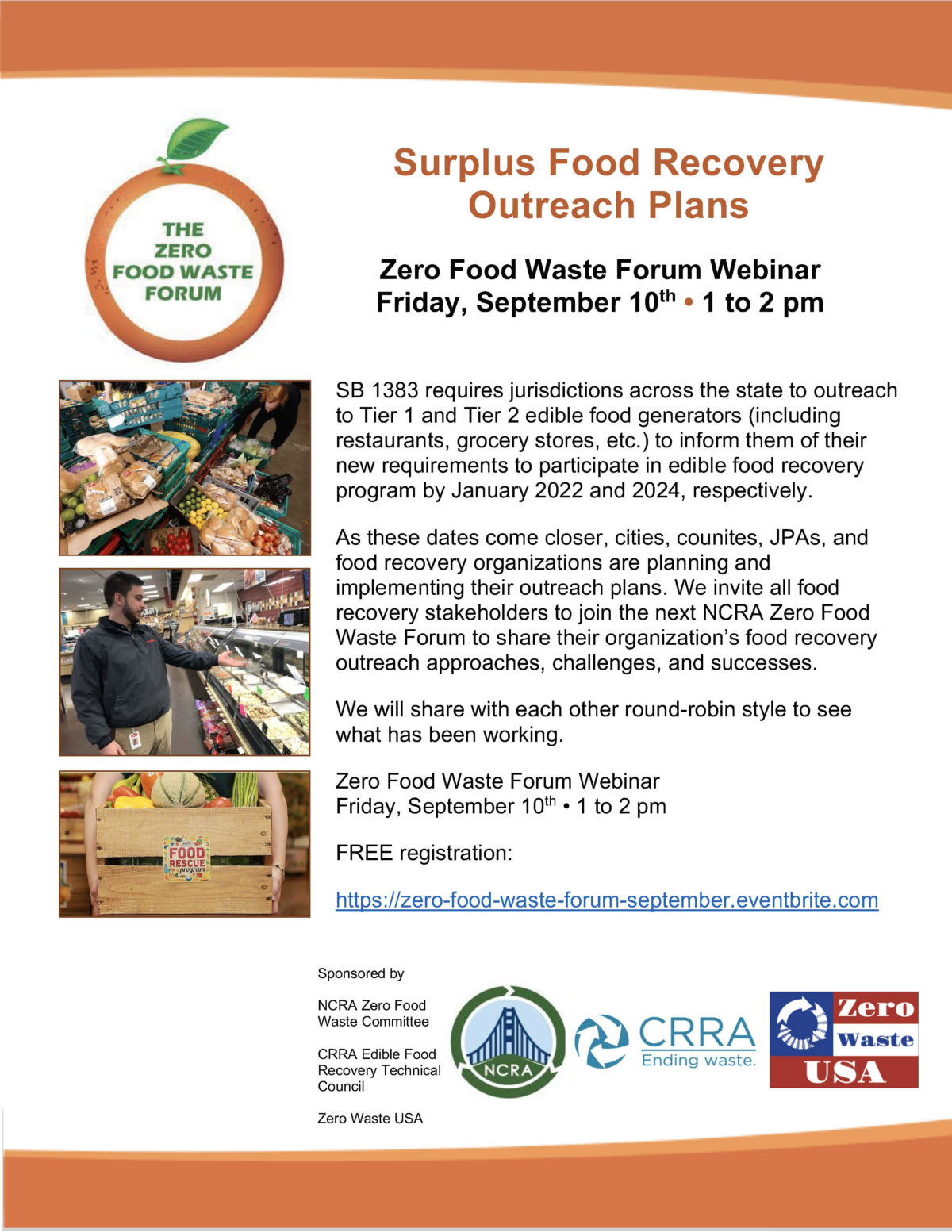Category: Newsletter
RU Postponed until March 2022!
On Thursday, August 19, after careful evaluation of all options, the NCRA Board decided not to hold Recycling Update on October 5. Instead we will host:
-
- A virtual Membership Meeting the evening of October 21 with special guests and songs! Costumes welcome!
- An outdoor networking event this Fall
- The next Recycling Update in March 2022
We will be sending future notices with more specifics. We have not yet determined whether RU in March 2022 will be in-person or virtual.
The decision to postpone RU was made for the following reasons:
-
- COVID Delta variant cases are rising and in-person events may not be allowed this fall.
- The RU Preferences Survey yielded mixed results as to whether or not members wanted an in-person indoor conference, especially if proof of vaccination and masks were required. We also believe the survey results would have been different if the survey had been conducted slightly later, after the increase in Delta variant cases and the re-establishment of some social distancing measures by health officials.
- A desire to return to our normal March date for RU each year.
Please consider taking part in the National Recycling Congress – on November 3 and 4, and/or the National Zero Waste Conference – December 8 and 9. NCRA is a collaborating partner in both.
Thank you to the RU Program Committee for their hard work, to the confirmed Speakers for their flexibility and to the Board and Staff for making this challenging decision.
Thank you to the 168 people who responded to the RU preferences survey. It really helped clarify this decesion.
If your NCRA membership has expired, please log-in to renew your membership ASAP! This ensures you will continue to receive the NCRA News and discounts on NCRA events. Your membership help support NCRA’s advocacy and education efforts throughout the year. Because we did not receive the usual membership renewals around RU you this year, NCRA’s membership and funds have been diminished.
Plastic Free July – What Actions Are You Taking?
Plastic Free July 2021 …
WHAT ACTIONS ARE YOU TAKING…
… to foster sustainable behavior change?
By Bonnie Betts, NCRA Social Media Coordinator
 For folks passionate about Zero Waste, recycling and protecting Earth’s delicate ecosystems, Plastic Free July (PFJ) is a time to rally and learn about the movement to break free from plastic. We get to show our network that living without plastic can be done!
For folks passionate about Zero Waste, recycling and protecting Earth’s delicate ecosystems, Plastic Free July (PFJ) is a time to rally and learn about the movement to break free from plastic. We get to show our network that living without plastic can be done!
The initiative originated in Australia back in 2011, spearheaded by the Plastic Free Foundation. The vision of PFJ is to see a world free of plastic waste. Despite the turmoil and uncertainties of the pandemic, July of 2020 had an estimated 326 million people across the globe who took part in the challenge from 177 countries. Overall, PFJ participants have reduced their household waste by almost 5% per year, and 8.5 out of 10 people have permanently changed their behavior.
The PFJ challenge uses elements of Nudge Theory by Richard Thaler & Cass Sunstein, and Community-Based Social Marketing by Dr. Doug McKenzie-Mohr (CBSM) to intentionally encourage sustainable behavior change. Both are based in social psychology and draw from the idea that sustainable behavior change is most effective when it involves direct contact with people, in their community. Most importantly, this method encourages that the desirable action (i.e. stop using plastic) be met positively, rather than discouraging harmful actions.
The point to having a PFJ challenge is to positively change people’s relationship with plastic in order to make more sustainable choices and ultimately stop the reliance on plastic all together. Here is a quick snap-shot of the social psychology elements at play:
Social Norming – Exemplifying the desired behavior for others to adopt:
This could look like shopping with reusable bags, bringing reusable utensils, containers when dining out, refusing straws and single-use to-go items, refilling your water bottle…
Restaurant owners can display a blurb – on their window, website or ads the percentage of customers who opt out of single-use to-go items (utensils, napkins, straws, etc.).
Social Diffusion – Quickly scale the desired behavior throughout your personal sphere:
Whatever the action is, utilize strength in numbers to get the message out. At the community level – This could look like having neighborhood green teams, compost-food scrap collection collective, Zero Waste champions at work or, local Zero Waste business collectives. Individuals can utilize social media to build awareness and share actions to their immediate networks.
Prompts – Visual or auditory reminders closest to the desired behavior:
In the community we see this most often with visually appealing receptacle signage. Restaurants can include prompts on their ordering menu to forgo single-use to-go items.
Incentives – Reward positive behavior, include promotions, gamify the challenges:
Business initiatives could strategically promote deals that encourage multiple sustainable actions like recycling + composting instead only recycling. Work teams and friends can take part in friendly competitions. Business, and community organizations can offer raffle prizes.
Convenience – Make doing the right thing easier, or the unsustainable action less convenient:
We have seen this with centralized receptacle stations. Green events can make reusables more appealing. Municipalities like the City of Berkeley, include single-use to-go item fees.
When it comes to fostering sustainable behavior change it is important to understand the underlying psychology that perpetuates our decisions.
What actions do I want people to take? What are the barriers? How can I overcome those barriers? These are important questions to ask.
Looking for Plastic Free July Challenge Resources?
Fillgood.co, based in Berkeley, has a great weekly step-by-step challenge and other great examples of what individuals can do in the home and community.
Also, the Berkeley Ecology Center has free stellar resources and events available throughout the month.
# # #
Letters of Support Needed, 7/4/21
By Doug Broms, ZWAC Co-Chair
Posted below are three draft support letters which I propose NCRA support and other groups could reuse:
- AB 1261 Burke D State Air Resources Board: greenhouse gas emissions: incentive programs. LETTER OF SUPPORT
- SB 27 Skinner D Carbon sequestration: state goals: natural and working lands: registry of projects. LETTER OF SUPPORT
- SB 244 Archuleta D Lithium-ion batteries: illegal disposal: fire prevention. SB 244 is similar to AB 1509 Mullin D Solid waste: lithium-ion batteries. which NCRA had supported in 2019. LETTER OF SUPPORT
If there will be sufficient interest, then NCRA support letters also could be drafted for these three other previously proposed Bills:
- AB 762 Lee D Hazardous emissions: schoolsites: private and charter schools.
- AB 1311 Wood D Recycling: beverage containers.
SB 451 Dodd D Beverage container recycling: pilot projects.
Thanks for your timely considering. Enjoy your July 4 fireworks. […]
Why Isn’t Everyone Composting Yet? Part 3 – Telling the Story
By Tim Dewey-Mattia, Public Education Manager, Napa Recycling & Waste Services and NCRA Board Member, 4/1/2021
Part 3: Telling the Story (Part 1) (Part 2) (Part 3)
Former NCRA President Arthur R Boone recently posed a question to me via email on “Why the conversion of the yard debris green cart into the full-service organics cart has stumbled badly in getting rolled out? Would love to understand all that resistance better.” Here were my thoughts, which we both thought would be valuable to share with the rest of the NCRA News readers.
—
In Part 1 and Part 2 of this series, we talked about behavior change and uneven access to programs. For the third and final article, we’ll look at how we can “tell the story” of composting in a more compelling and effective way.
Organics program branding has also been an ongoing problem. Recycling is recycling… but in this case, is it the compost cart, or the organics cart, or the green bin or the yardwaste (+) cart, etc? I think this brings up the larger issue that customers don’t value organics; not like they would an aluminum can or cardboard box, which provides some perception of value because it can be made into a new can or box. There is a solution here – call it one thing. In Napa, we call it the “compost cart” since we make compost from it all, just like the “landfill cart” is the stuff we take to the landfill.
You also need to aggressively educate the community about making compost, and why making compost reduces greenhouse gas emissions, and adds nutrients back into the soil… while also reminding them of the bad stuff that happens when it goes to landfill. I think facility tours (or videos) are key here. Nnot being able to give tours of our composting facility during the pandemic has been a big bummer. There is still a lack of perception of why it’s important to compost – but the reasoning is compelling, so we need to tell the story more powerfully and effectively.
We definitely need more data to figure out exactly where we are – we’ve found it’s really hard to measure participation in curbside organics programs, since if you look in the compost cart the food is often hidden in the yard trimmings. Meanwhile, if you look in the trash, everything is hidden in bags. This is one of my big hopes with SB 1383 – the law requires us to sample all routes, and facility streams, each year. This could give us really powerful data on what is ending up where, and how it progresses over time. Also, while San Francisco and Alameda County have had mandatory programs for a while now, this will be the first time in most places that it will be illegal to put organics (or recyclables) in the trash…up to now, you really only got in trouble if you contaminated your recycling or organics streams.
One silver lining from the pandemic is that we do seem to be seeing more participation in the residential curbside organics collection… but it’s still not where it needs to be. I will say that, as a whole, I’m much more optimistic about organics than recycling at this point… so even with all of these hiccups I think things are generally going in the right direction with organics programs, so there’s that!
Questions or comments? As always feel free to contact me at tim@naparecycling.com… or follow up with a Letter to the Editor or article of your own in the NCRA News!


